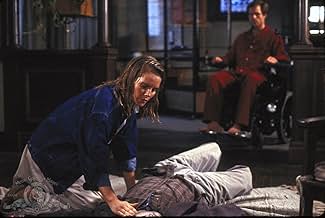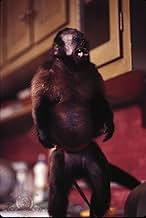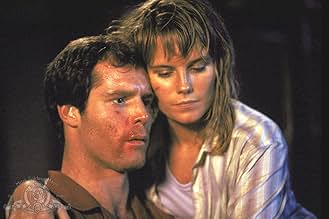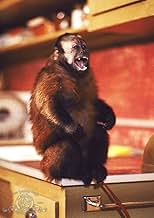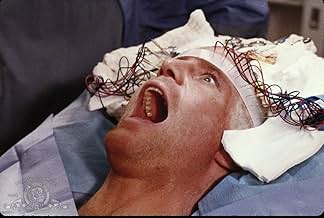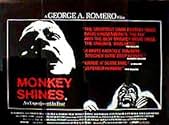IMDb-BEWERTUNG
6,2/10
13.964
IHRE BEWERTUNG
Ein querschnittsgelähmter Mann lässt sich von einem dressierten Affen bei seiner Lähmung helfen, bis der kleine Affe beginnt, Gefühle zu entwickeln und gegen seinen neuen Herrn zu wüten.Ein querschnittsgelähmter Mann lässt sich von einem dressierten Affen bei seiner Lähmung helfen, bis der kleine Affe beginnt, Gefühle zu entwickeln und gegen seinen neuen Herrn zu wüten.Ein querschnittsgelähmter Mann lässt sich von einem dressierten Affen bei seiner Lähmung helfen, bis der kleine Affe beginnt, Gefühle zu entwickeln und gegen seinen neuen Herrn zu wüten.
- Regie
- Drehbuch
- Hauptbesetzung
- Auszeichnungen
- 7 Gewinne & 2 Nominierungen insgesamt
Empfohlene Bewertungen
Aah, George A Romero - the master himself - does it again. This is a very stylish thriller and perfect study of how man's apparent progress goes horribly wrong.
The film captured my attention from the opening moment. Jason Beghe is perfectly cast in this demanding role. It was interesting (if somewhat creepy) to see how things started going wrong, very subtle at first, and how the situation declined to absolute chaos and mayhem. The romance interest felt very natural and enjoyable. Quite often the romance feels forced into a film; here it seemed inevitable given the circumstances.
This is a true classic!
The film captured my attention from the opening moment. Jason Beghe is perfectly cast in this demanding role. It was interesting (if somewhat creepy) to see how things started going wrong, very subtle at first, and how the situation declined to absolute chaos and mayhem. The romance interest felt very natural and enjoyable. Quite often the romance feels forced into a film; here it seemed inevitable given the circumstances.
This is a true classic!
It seems that every once and a while, a neat little horror film comes along that eschews genre conventions and is able to tap into a new vein to provide its scares. Writer-director George A. Romero, of "Night of the Living Dead" (1968) and "Dawn of the Dead" (1978) infamy, brings forth "Monkey Shines," an adaptation of the novel by Michael Stewart.
Romero has always been a director who goes for the throat in delivering the shocks in his horror pictures. But in the savage gore and mayhem, he has never lost sight of the human characters, their drama, and their plight. In "Monkey Shines," Romero seems to have been domesticated somewhat - dare I say, "tamed" - in that characters and drama are most essential to the core of the film, and that horror is really the last thing on his mind.
"Monkey Shines" begins with the Good Day Gone Bad, Really Bad: Allan Mann (Jason Beghe), is a highly physical law student who goes for a jog early one morning after spending the night with his girlfriend Linda (Janine Turner). To avoid a dog on the sidewalk, he unknowingly runs into the path of an oncoming truck. He wakes up several weeks later in the hospital, now a quadriplegic, paralyzed, unable to use his body anywhere below the neck.
Confined to a wheelchair he moves around by working a lever with his mouth and having to rely on live-in nurse Maryanne (Christine Forrest), his doting, overbearing mother Dorothy (Joyce Van Patten) and having to deal with his pompous surgeon Dr. Wiseman (Stanley Tucci) who begins having an affair with Linda, Allan gives up and tries to commit suicide. Luckily, Allan's mad-scientist friend Geoffrey (John Pankow) may have a solution: Ella, an extremely intelligent capuchin monkey who is being trained by animal specialist Melanie Parker (Kate McNiel) to be a sort of help-primate for paraplegics and quadriplegics, much like a seeing-eye dog is used for blind people.
At first, a great weight seems lifted off Allan's shoulders; Ella's the perfect helper - she can answer the phone, play cassette tapes in the radio, and even help Allan turn the pages of his books when he reads. She even raises her hand in class for her turn to be called on. A deep bond develops between the two that's right out of any made-for-TV movie about hope and determination to beat the odds. Of course, and this is where the horror elements begin to kick in, what Allan doesn't know is that Ella is really Geoffrey's guinea pig in an experiment to create super-intelligent primates: he's been secretly injecting her with human brain tissue, which explains her super-intelligence in helping to make Allan's life a little bit easier. Even more horrifically, Allan has been having incredibly realistic nightmares in which he has acquired a monkey's-eye view of the world, and Ella is subconsciously acting out his deeply-suppressed anger, frustration, hatred, and rage for those around him. And it soon begins a battle of wits to see who is really controlling who, which also sees if Charles Darwin was really right all those years ago.
"Monkey Shines" develops so nicely during its first hour that it's easy to forget that first and foremost, it's a horror film and not just any horror film, a George A. Romero-directed horror film. Romero shows remarkable restraint in combining both the human story with the horror story, that both elements are given enough screen time to thoroughly develop and not seem so tacked-on to each other. That atmosphere and tension of the film's horror-themed second half is pretty intense, even if things can be forgiven for the haunted house-style climax.
This is easily the best-acted film Romero has ever directed, though obviously it's not his best; that honor goes to "Dawn of the Dead." All of the characters turn in fine and realistic performances, including John Pankow as Allan's drug-addled mad-scientist friend who truly has his friend's best interests at heart, even if they're morally gray in the end. But there is one performer who is highly deserving of much praise, and that is Jason Beghe. Jason Beghe delivers a strong, controlled central performance that in my opinion, was criminally overlooked by a great many awards organizations. His performance is one of the most convincing and sympathetic portrayals of a physically handicapped protagonist I've ever seen in the movies. Essentially a prisoner in his own body, he hits every emotive note perfectly, and we believe and can see where and why his anger and rage at his condition is one of the most believable performances in the history of Romero's long and distinguished career as a filmmaker.
"Monkey Shines" is an overlooked career highlight from a highly distinguished director, George A. Romero. Even more so, Jason Beghe's criminally underrated performance makes the film even more worthy of more significant praise.
This is one horror film that isn't monkeying around in the end. It is really scary.
8/10
Romero has always been a director who goes for the throat in delivering the shocks in his horror pictures. But in the savage gore and mayhem, he has never lost sight of the human characters, their drama, and their plight. In "Monkey Shines," Romero seems to have been domesticated somewhat - dare I say, "tamed" - in that characters and drama are most essential to the core of the film, and that horror is really the last thing on his mind.
"Monkey Shines" begins with the Good Day Gone Bad, Really Bad: Allan Mann (Jason Beghe), is a highly physical law student who goes for a jog early one morning after spending the night with his girlfriend Linda (Janine Turner). To avoid a dog on the sidewalk, he unknowingly runs into the path of an oncoming truck. He wakes up several weeks later in the hospital, now a quadriplegic, paralyzed, unable to use his body anywhere below the neck.
Confined to a wheelchair he moves around by working a lever with his mouth and having to rely on live-in nurse Maryanne (Christine Forrest), his doting, overbearing mother Dorothy (Joyce Van Patten) and having to deal with his pompous surgeon Dr. Wiseman (Stanley Tucci) who begins having an affair with Linda, Allan gives up and tries to commit suicide. Luckily, Allan's mad-scientist friend Geoffrey (John Pankow) may have a solution: Ella, an extremely intelligent capuchin monkey who is being trained by animal specialist Melanie Parker (Kate McNiel) to be a sort of help-primate for paraplegics and quadriplegics, much like a seeing-eye dog is used for blind people.
At first, a great weight seems lifted off Allan's shoulders; Ella's the perfect helper - she can answer the phone, play cassette tapes in the radio, and even help Allan turn the pages of his books when he reads. She even raises her hand in class for her turn to be called on. A deep bond develops between the two that's right out of any made-for-TV movie about hope and determination to beat the odds. Of course, and this is where the horror elements begin to kick in, what Allan doesn't know is that Ella is really Geoffrey's guinea pig in an experiment to create super-intelligent primates: he's been secretly injecting her with human brain tissue, which explains her super-intelligence in helping to make Allan's life a little bit easier. Even more horrifically, Allan has been having incredibly realistic nightmares in which he has acquired a monkey's-eye view of the world, and Ella is subconsciously acting out his deeply-suppressed anger, frustration, hatred, and rage for those around him. And it soon begins a battle of wits to see who is really controlling who, which also sees if Charles Darwin was really right all those years ago.
"Monkey Shines" develops so nicely during its first hour that it's easy to forget that first and foremost, it's a horror film and not just any horror film, a George A. Romero-directed horror film. Romero shows remarkable restraint in combining both the human story with the horror story, that both elements are given enough screen time to thoroughly develop and not seem so tacked-on to each other. That atmosphere and tension of the film's horror-themed second half is pretty intense, even if things can be forgiven for the haunted house-style climax.
This is easily the best-acted film Romero has ever directed, though obviously it's not his best; that honor goes to "Dawn of the Dead." All of the characters turn in fine and realistic performances, including John Pankow as Allan's drug-addled mad-scientist friend who truly has his friend's best interests at heart, even if they're morally gray in the end. But there is one performer who is highly deserving of much praise, and that is Jason Beghe. Jason Beghe delivers a strong, controlled central performance that in my opinion, was criminally overlooked by a great many awards organizations. His performance is one of the most convincing and sympathetic portrayals of a physically handicapped protagonist I've ever seen in the movies. Essentially a prisoner in his own body, he hits every emotive note perfectly, and we believe and can see where and why his anger and rage at his condition is one of the most believable performances in the history of Romero's long and distinguished career as a filmmaker.
"Monkey Shines" is an overlooked career highlight from a highly distinguished director, George A. Romero. Even more so, Jason Beghe's criminally underrated performance makes the film even more worthy of more significant praise.
This is one horror film that isn't monkeying around in the end. It is really scary.
8/10
While this will likely never be considered one of filmmaker George Romero's best, it still represents a commendable effort in one of his rare forays into studio productions (in this case Orion). Scripted by Romero based on a novel by Michael Stewart, it tells the story of Allan Mann (handsome Jason Beghe), a law student who gets into a horrible accident that renders him a quadriplegic. He soon becomes despondent enough to attempt suicide, but soon he receives some temporary salvation in the form of Ella (Boo), a capuchin monkey who is trained to see to his needs. What he doesn't know is that his friend Geoffrey (John Pankow) has been playing mad scientist and injecting the cute lil' thing with human brain cells. Soon the bond between patient and helper becomes so strong that a mental connection is made, and Ella is physically acting out Allan's worst impulses. So what is he going to do about this little homicidal primate? Romero does a good job here at telling a fairly interesting story, although some viewers might be turned off at the lack of sympathetic characters. Most of them are flawed to some degree or another - creepy dean Burbage (Stephen Root), smarmy, incompetent doctor Wiseman (Stanley Tucci), fair-weather girlfriend Linda (Janine Turner), bitchy nurse Maryanne (Christine Forrest, a.k.a. Mrs. Romero) - and even a guy like Geoffrey, who initially just wants to help, has his problems as he's obsessed with his work. At least Allan has an appealing love interest played by Kate McNeil, whom horror fans will recognize as the lead in the slasher "The House on Sorority Row". The cast is pretty good overall; Joyce Van Patten plays the stereotypically smothering mother to good effect, and it's a treat to see character actors Root and Tucci near the beginnings of their careers, but the one performer the audience is likely to remember is Boo, who's adorable and very well trained; the animal action is first rate throughout (there's also a rather annoying bird on hand). The evolving relationship between Allan and Ella makes for a compelling hook, and it makes one appreciate the real-life efforts that people put into training service animals, and the animals themselves. The film is light on horror - most of the violence is implied - as Romero tends to go for a more psychological approach, and refrains from going for the gore. Overall, this is a decent flick, worth a look for genre fans who are interested in checking out Romero's non-zombie films. Seven out of 10.
This movie's not going to have a fan base larger than Night of the Living Dead or Dawn of the Dead, but it is another example of Romero's uniqueness as s film maker. An original story with an original cast, Romero adds to the horror genre by going somewhere where no other film maker has gone before. Monkey Shines cast includes Christine Forrest who shows her finest performance as the nurse. Worth checking out, so check it out.
"Monkey Shines" is an honorable effort that doesn't quite work. It deserves credit for originality, but falls short of the mark.
The concept is interesting, but the execution leaves much to be desired. A paralyzed man's life is made easier with the help of Ellie, a monkey trained to help disabled people get by with their daily lives. However, she used to be a lab animal who has had human brain cells injected in experiments. A bond forms between the two, and she acts out his violent desires.
The final act does a good job in delivering the goods, but the film takes too long to get going, diluting the overall effect. In fact, at times one almost forgets it's supposed to be a horror movie. When it gets going, it works, although the very ending is a bit much.
I'm still not sure the sci-fi gimmick was necessary. Surely they could have done pretty much the same things without it? Something more supernaturally orientated perhaps? Still, I admired Romero's willingness to take chances and try his hand at a more subdued thriller. Jason Beghe does a credible job in the role, and we are offered a rare glance at the frustrations of the disabled. A tighter film would have better achieved the director's goals.
**1/2 (out of ****)
An Orion Pictures release
The concept is interesting, but the execution leaves much to be desired. A paralyzed man's life is made easier with the help of Ellie, a monkey trained to help disabled people get by with their daily lives. However, she used to be a lab animal who has had human brain cells injected in experiments. A bond forms between the two, and she acts out his violent desires.
The final act does a good job in delivering the goods, but the film takes too long to get going, diluting the overall effect. In fact, at times one almost forgets it's supposed to be a horror movie. When it gets going, it works, although the very ending is a bit much.
I'm still not sure the sci-fi gimmick was necessary. Surely they could have done pretty much the same things without it? Something more supernaturally orientated perhaps? Still, I admired Romero's willingness to take chances and try his hand at a more subdued thriller. Jason Beghe does a credible job in the role, and we are offered a rare glance at the frustrations of the disabled. A tighter film would have better achieved the director's goals.
**1/2 (out of ****)
An Orion Pictures release
Wusstest du schon
- WissenswertesThis was the first film role for Stephen Root, then a stage actor. According to Root, he had been instructed by his agent not to let the casting directors know that he was inexperienced with film as an actor. Root's official debut was Crocodile Dundee II (1988), which had been released in theaters a month before this film, despite being shot a month after it.
- PatzerFisher incorrectly refers to performing an "autopsy" on Ella. An autopsy is performed on human remains. The correct term for examining animal remains postmortem is "necropsy". This is a common mistake for most people, one that Fisher would not make, given his profession.
- Zitate
Geoffrey Fisher: You're a clinical cunt.
- Crazy Credits"Introducing Boo as Ella"
- Alternative VersionenEarlier versions of Monkey Shines allegedly contained a bizarre brain surgery scene, as well as several abusive scenes involving the small monkey, Ellie. Although the scenes were all staged and no animals were harmed in the making of the movie, the filmmakers decided it would be better to simply leave them out to avoid conflicts.
- VerbindungenFeatured in Document of the Dead (1980)
Top-Auswahl
Melde dich zum Bewerten an und greife auf die Watchlist für personalisierte Empfehlungen zu.
Details
Box Office
- Budget
- 7.000.000 $ (geschätzt)
- Bruttoertrag in den USA und Kanada
- 5.344.577 $
- Eröffnungswochenende in den USA und in Kanada
- 1.902.024 $
- 31. Juli 1988
- Weltweiter Bruttoertrag
- 5.344.577 $
Zu dieser Seite beitragen
Bearbeitung vorschlagen oder fehlenden Inhalt hinzufügen


